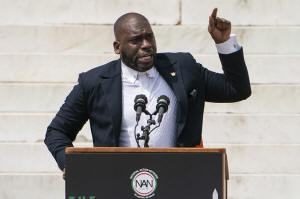A 40-day Target boycott began this week. What to know about the protest
and its potential impact
[March 07, 2025] By
WYATTE GRANTHAM-PHILIPS
NEW YORK (AP) — A 40-day boycott of Target that calls for supporters to
give up shopping at the company's stores during the Lenten period kicked
off this week, to protest the discount retailer's decision to end some
of its diversity, equity and inclusion initiatives.
The Rev. Jamal Bryant, senior pastor of New Birth Missionary Baptist
Church near Atlanta, organized the “Target Fast” that began Wednesday —
the first day of Lent — along with other faith and civil rights leaders.
A website for participants points to the spending power of Black
Americans and described the boycott as “a spiritual act of resistance."
“This is a fast for accountability. A fast for justice. A fast for a
future where corporations do not bow to pressure at the expense of
marginalized communities," reads a message on targetfast.org. “Turn your
dollars into data, power, and change.”
Target declined to comment directly on the boycott, which runs through
April 17. Here's what to know.
What happened with Target's DEI initiatives?
Target announced in January that it would phase out a handful of DEI
initiatives, including a program designed to help Black employees build
meaningful careers and promote Black-owned businesses.
The Minneapolis-based company, which operates nearly 2,000 stores
nationwide and employs more than 400,000 people, said it long had
intended to end the program this year, but its announcement came after
other prominent American corporations scaled back their diversity
activities.
Target also said it would stop setting hiring and promotion goals for
women, members of racial minority groups and other underrepresented
communities.
Conservative activists, and more recently, President Donald Trump’s
White House, have sought to rid the federal government, schools and
private workplaces of DEI policies that were adopted to counter
discrimination. Critics maintain the range of goals and programs arising
from such policies are themselves discriminatory and counterproductive.
While Target rival Walmart also rolled back its DEI initiatives in
November, Target's actions seemed to cause more customer outrage.
Numerous calls for boycotts emerged across the country, including from
Minneapolis civil rights activists who gathered outside Target's
headquarters. The daughters of one of Target's co-founders also
expressed shock and alarm.

“The surprise element is what attracted customer ire” said Akshay Rao, a
marketing professor at the University of Minnesota’s Carlson School of
Management. He and others point to Target's previous messaging around
DEI and reputation as a strong advocate for the rights of racial
minorities and LGBTQ+ people.
Target also faced boycott calls almost 15 years ago after it was
revealed that the company donated to an organization that supported
Republican Tom Emmer, then a vocal opponent of gay marriage, in his
campaign to become Minnesota's governor. Then, as now, Target received
more blowback than other companies that made similar donations because
its actions ran counter to expectations, Rao said.
What does giving up Target for 40 days involve?
Organizers of the "Target Fast” urged people who take part to stop
shopping at Target and instead redirect their dollars to Black-owned
businesses.

[to top of second column] |

Jamal Bryant, senior pastor of New Birth Missionary Baptist Church,
speaks during the March on Washington, Friday Aug. 28, 2020, at the
Lincoln Memorial in Washington. (AP Photo/Jacquelyn Martin, Pool,
File)
 Targetfast.org lists the demands of
boycotters, which include Target completely restoring its
commitments to DEI and honoring a previous pledge to spend over $2
billion with Black-owned businesses by the end of 2025.
Bryant, the pastor spearheading the protest, told The Washington
Post on Wednesday that about 110,000 people signed up to
participate. Bryant was not immediately available for further
comment when The Associated Press contacted his staff on Thursday.
The Rev. Al Sharpton, founder and president of the
National Action Network, announced in late January that the civil
rights organization would identify two companies in the next 90 days
that will be subjected to consumer boycotts for abandoning their DEI
pledges.
What impact will the ‘Target Fast’ have?
Time will tell. But experts say boycott appeals reflect the risk
companies face when making moves that could potentially alienate
their customer base — particularly when the moves go against past
corporate messaging.
“One of the ways that you can really upset (consumers) is to claim
to be something and then violate that standard that you claim to
be,” Americus Reed II, a marketing professor at the University of
Pennsylvania’s Wharton School of Business, said. “It lands really
poisonous on people, especially in vulnerable communities where
people have put their trust in you. ... And now, you're reversing."
A sense of betrayal can be a significant motivator for customers to
take their money elsewhere, Reed said. And successful boycotts, he
adds, need to generate enough energy to “make this not just a
moment, but a movement.”
Targeting single companies for a more prolonged period of time may
prove effective, but organizers need to provide multiple ways for
people to participate, Reed said.
Pledging to avoid large chains like Target or Walmart, for example,
may be difficult for those who have fewer alternatives either
geographically or because of what they can afford. Reed says
targeted “buycotts,” such as trying to only purchase products from
the Black-owned brands that large chains stock, could help bridge
that gap.
Larger market pressures, such as the tariffs on goods from Canada,
China and Mexico that Trump imposed this week — are likely to have
bigger implications for Target’s bottom line in the months ahead,
Rao said.
Getting consumers to change their buying habits, even for a cause
they support, can be very difficult, Reed said. Boycotts that gain
traction online also sometimes come across like “virtue signaling as
opposed to real change," but making them part of the national
conversation nonetheless is a huge step, he said.
“A lot of times, you’re in sort of inertia in your life as a
consumer. And you’re just rolling along, you’re clicking a button on
Amazon and getting your stuff," Reed said. "Then something like this
(boycott) comes up, and you’re forced to confront the reality of,
‘OK, what am I going to do?’”
All contents © copyright 2025 Associated Press. All rights reserved |